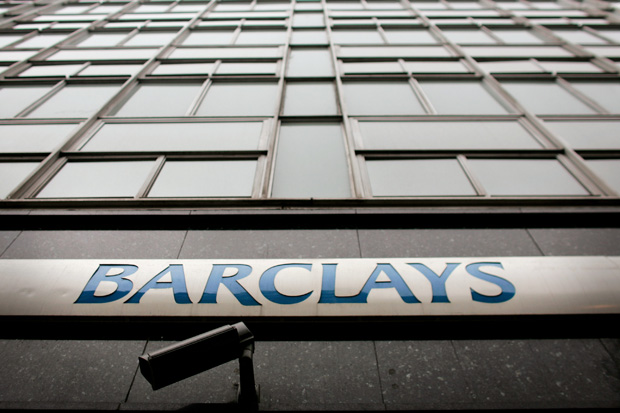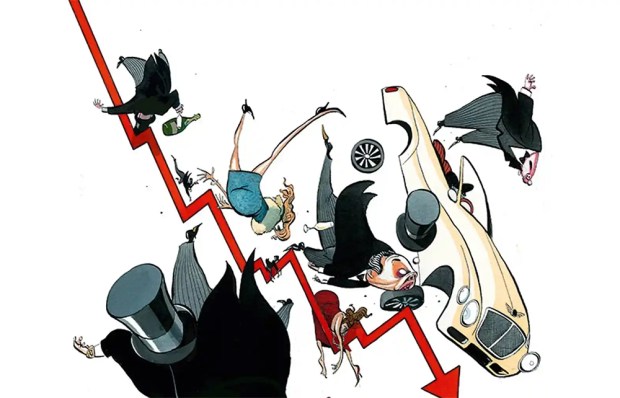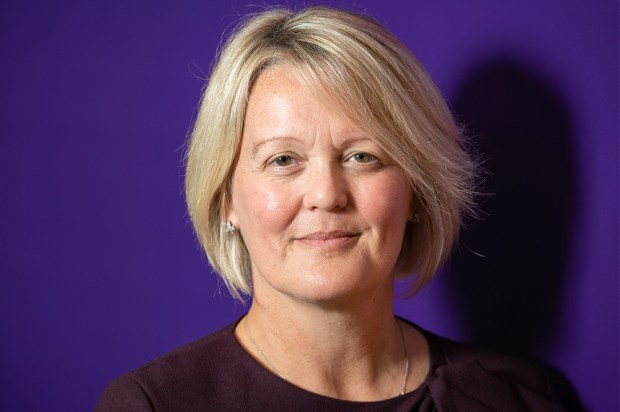Oh woe. Investment bank profits are evaporating after a disastrous contraction of trading revenues reflecting zero-to-negative interest rates, weak commodity prices and worries about China and other emerging markets. Not to mention the stagnant eurozone, the possibility of Brexit, increased capital requirements (which will rise further for banks that must ‘ringfence’ their trading operations) and the demoralising impact of regulatory moves to cap and force clawback of bonuses.
Across the Atlantic, Goldman Sachs, Morgan Stanley, Citi and Bank of America have felt the chill, as have Credit Suisse, UBS and Deutsche in Europe. Barclays, the last British contender in this arena, was expecting a stormy AGM this week as shareholders — stung by a slashed dividend, a pathetic share price and a weak first quarter — lose patience with the umpteenth restructuring under new-broom chief executive Jes Staley.
Pundits are now debating whether — eight years after the fall of Lehman — we’re witnessing the death rattle of an entire sector rather than a seasonal setback amplified by a regulatory crackdown. One thing’s certain: over the decades since investment banking activity began migrating from partnerships to public companies, it has been a nightmare of rollercoaster performance and recurrent scandal for its shareholder owners.
It has also, of course, made many bank employees fabulously rich — but has it been super-effective in its role of channelling the world’s surplus funds into capital for enterprise and finance for governments? Not really, or at least not noticeably more so than in the previous era that began with the birth of the Eurobond market in the 1960s. Some of us have long argued that the future lies in a return to the best of the past: a constellation of partner-owned niche financial firms, working collaboratively as deals dictate, advisers well separated from traders, clients well served in long-term relationships of trust, risks aligned with incentives, rules clear enough not to be gamed. If that’s the way investment banking is heading, I’m all for it.
Going, going, gone?
BHS made bigger headlines — but as a parable of changing times, the fate of Austin Reed was just as vivid. ‘Going Going Gone… Everything Ends In Two Days’ said an email announcing a deep-discount sale. Founded in 1900, the upmarket menswear chain has struggled to rejuvenate both its image and its customer base of chaps like me — except I’m too price-conscious to shop in the main stores, preferring the bargain-seconds outlet where I bought a £650 suit for £150. It had been tailored for a boardroom fat-cat who failed to collect and pay for it, and evidently that’s the way the whole business has gone, leading to five years of falling sales and branch closures. Now the firm is owned by Alteri Investors, a vulture fund specialising in ‘distressed retailers’, and on Tuesday it followed BHS into administration.
‘Everything ends in two days’ may be an exaggeration but Austin Reed’s 1,000 jobs are at risk to add to 11,000 in BHS, even if some are saved as smarter operators cherry-pick store sites from both chains. In BHS’s case, mud has been slung at former owner Sir Philip Green and the consortium of financiers to whom he sold it last year for a pound, accusing both of cynically scouring money out of a moribund business rather than pouring more in; they have also failed to fill a big hole in its pension fund. But the truth is that if a ruthless maverick like Green — gifted with an intuitive streak of retail genius in his heyday — could not turn BHS around, no one could. Arguably, both BHS and Austin Reed have been fading for 30 years in a fast-moving, fashion-sharp, technology-driven marketplace in which new competitors spring up all the time. Darwin-ism is at work in the high street, and that’s what feeds the vultures.
C’est la guerre
If you want to know why nothing’s happening at Hinkley Point, site of the unbuilt nuclear reactor that’s supposed to start providing 7 per cent of the UK’s electricity in a decade’s time, scan the French media. A make-or-break decision to invest in the £18 billion project by state-controlled energy giant EDF was expected imminently but has been deferred to September. Reporting over here emphasises EDF’s need to raise capital (which it did this week) before making a final commitment to Hinkley. Reporting over there emphasises the fact that trade unions represented in EDF are enraged that the project might have gone ahead without their say-so, and have demanded, on pain of court action, the formal consultation to which French law entitles them. Meanwhile, 400 EDF managers have signed an open letter condemning the project as potentially ruinous for the company and bad for French interests generally. As one Paris columnist puts it: ‘Si ce n’est pas une déclaration de guerre, cela y ressemble étrangement.’
Before they were famous
I’m an avid reader of the annual Sunday Times Rich List — for the patterns of wealth creation it illuminates but also for the fun of finding familiar names. This year I spotted ten of whom I could say ‘I knew him in the City when we were young.’ Between them they have made £3.7 billion — and none of them did it as bonus-hunting employees of shareholder-owned banks. Instead they did their own thing, in the money world or outside, and I guess what they have in common is appetite for risk, confidence in their own judgment, and luck.
The one I’m least surprised to see listed is the billionaire investor Nicholas Roditi, whose focus on profit opportunities was pretty frightening when he was briefly my boss 40 years ago. The name that gives me most pleasure is that of Johnnie Boden, who broke out of the City in frustration and struggled through difficult years to make his mail-order clothing brand the success it became. I think he’s the only person I ever hired as a graduate trainee who went on to make £410 million.
Got something to add? Join the discussion and comment below.
Get 10 issues for just $10
Subscribe to The Spectator Australia today for the next 10 magazine issues, plus full online access, for just $10.
You might disagree with half of it, but you’ll enjoy reading all of it. Try your first month for free, then just $2 a week for the remainder of your first year.















Comments
Don't miss out
Join the conversation with other Spectator Australia readers. Subscribe to leave a comment.
SUBSCRIBEAlready a subscriber? Log in